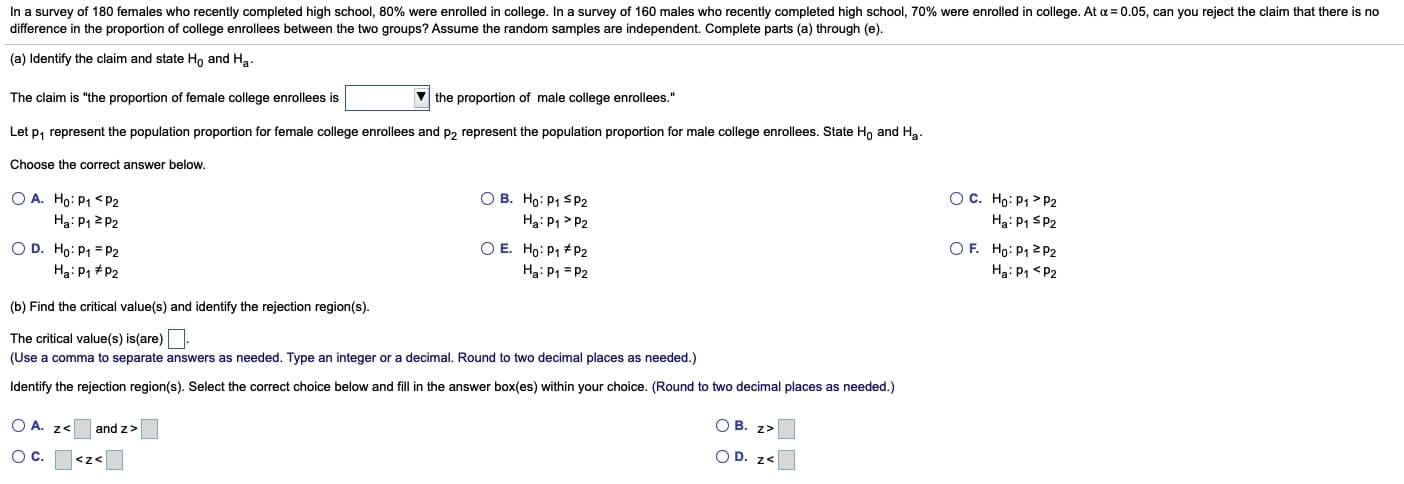In a survey of 180 females who recently completed high school, 80% were enrolled in college. In a survey of 160 males who recently completed high school, 70% were enrolled in college. At a = 0.05, can you reject the claim that there is no difference in the proportion of college enrollees between the two groups? Assume the random samples are independent. Complete parts (a) through (e). (a) Identify the claim and state Ho and Ha. The claim is "the proportion of female college enrollees is V the proportion of male college enrollees." Let p, represent the population proportion for female college enrollees and p, represent the population proportion for male college enrollees. State Ho and Ha. Choose the correct answer below. OC. Ho: P1 > P2 Ha: P1 SP2 OF. Ho: P1 2P2 Ha: P1 P2 OD. Ho: P1 = P2 O E. Ho: P1 * P2 Ha: P1 = P2 Ha: P1 + P2 (b) Find the critical value(s) and identify the rejection region(s). The critical value(s) is(are) (Use a comma to separate answers as needed. Type an integer or a decimal. Round to two decimal places as needed.) Identify the rejection region(s). Select the correct choice below and fill in the answer box(es) within your choice. (Round to two decimal places as needed.) O A. z< and z> O B. z> Oc.
In a survey of 180 females who recently completed high school, 80% were enrolled in college. In a survey of 160 males who recently completed high school, 70% were enrolled in college. At a = 0.05, can you reject the claim that there is no difference in the proportion of college enrollees between the two groups? Assume the random samples are independent. Complete parts (a) through (e). (a) Identify the claim and state Ho and Ha. The claim is "the proportion of female college enrollees is V the proportion of male college enrollees." Let p, represent the population proportion for female college enrollees and p, represent the population proportion for male college enrollees. State Ho and Ha. Choose the correct answer below. OC. Ho: P1 > P2 Ha: P1 SP2 OF. Ho: P1 2P2 Ha: P1 P2 OD. Ho: P1 = P2 O E. Ho: P1 * P2 Ha: P1 = P2 Ha: P1 + P2 (b) Find the critical value(s) and identify the rejection region(s). The critical value(s) is(are) (Use a comma to separate answers as needed. Type an integer or a decimal. Round to two decimal places as needed.) Identify the rejection region(s). Select the correct choice below and fill in the answer box(es) within your choice. (Round to two decimal places as needed.) O A. z< and z> O B. z> Oc.
Holt Mcdougal Larson Pre-algebra: Student Edition 2012
1st Edition
ISBN:9780547587776
Author:HOLT MCDOUGAL
Publisher:HOLT MCDOUGAL
Chapter11: Data Analysis And Probability
Section: Chapter Questions
Problem 8CR
Related questions
Question

Transcribed Image Text:In a survey of 180 females who recently completed high school, 80% were enrolled in college. In a survey of 160 males who recently completed high school, 70% were enrolled in college. At a = 0.05, can you reject the claim that there is no
difference in the proportion of college enrollees between the two groups? Assume the random samples are independent. Complete parts (a) through (e).
(a) Identify the claim and state Ho and Ha.
The claim is "the proportion of female college enrollees is
V the proportion of male college enrollees."
Let p, represent the population proportion for female college enrollees and p, represent the population proportion for male college enrollees. State Ho and Ha.
Choose the correct answer below.
OC. Ho: P1 > P2
Ha: P1 SP2
OF. Ho: P1 2P2
Ha: P1 <P2
O A. Ho: P1 <P2
Ha: P1 2 P2
O B. Ho: P1 SP2
Ha: P1 > P2
OD. Ho: P1 = P2
O E. Ho: P1 * P2
Ha: P1 = P2
Ha: P1 + P2
(b) Find the critical value(s) and identify the rejection region(s).
The critical value(s) is(are)
(Use a comma to separate answers as needed. Type an integer or a decimal. Round to two decimal places as needed.)
Identify the rejection region(s). Select the correct choice below and fill in the answer box(es) within your choice. (Round to two decimal places as needed.)
O A. z<
and z>
O B. z>
Oc.
<z<
O D. z<

Expert Solution
This question has been solved!
Explore an expertly crafted, step-by-step solution for a thorough understanding of key concepts.
This is a popular solution!
Trending now
This is a popular solution!
Step by step
Solved in 4 steps with 3 images

Knowledge Booster
Learn more about
Need a deep-dive on the concept behind this application? Look no further. Learn more about this topic, statistics and related others by exploring similar questions and additional content below.Recommended textbooks for you

Holt Mcdougal Larson Pre-algebra: Student Edition…
Algebra
ISBN:
9780547587776
Author:
HOLT MCDOUGAL
Publisher:
HOLT MCDOUGAL

Holt Mcdougal Larson Pre-algebra: Student Edition…
Algebra
ISBN:
9780547587776
Author:
HOLT MCDOUGAL
Publisher:
HOLT MCDOUGAL